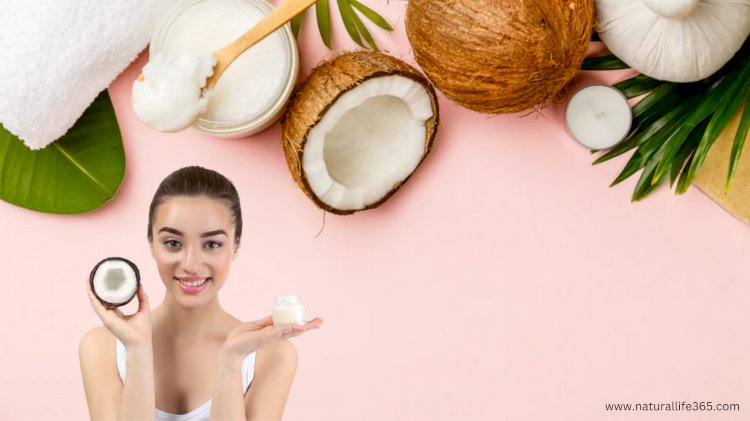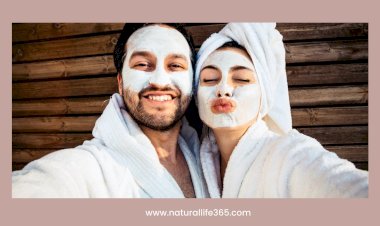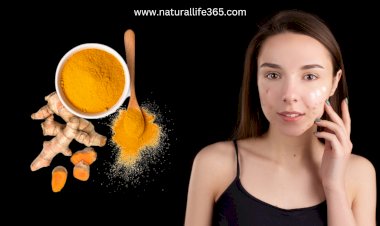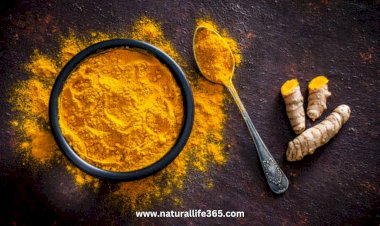Beauty Benefits of Coconut Oil
Unlocking Coconut Oil's Beauty Secrets: Discover the transformative benefits for your skin, hair & more. Embrace natural radiance now!

In the world of beauty and skincare, where a multitude of products with long ingredient lists and hefty price tags vie for our attention, there's one natural treasure that has stood the test of time and continues to amaze us with its versatility and effectiveness. I am talking about none other than coconut oil.
Coconut oil, derived from the flesh of coconuts, has been used for centuries in India for its myriad of benefits, not only in cooking but also in beauty and skincare. This tropical elixir is like a hidden gem in your pantry, waiting to be discovered and harnessed for its incredible beauty-enhancing properties.
Whether you're seeking natural solutions for dry skin, damaged hair, or simply looking to simplify your beauty regimen, coconut oil might just be the beauty secret you've been searching for.
So, let's delve into the world of coconut oil and explore how this natural wonder can elevate your beauty game, one application at a time.
Skin Health
Moisturizing Properties and Skin Hydration
Organic Harvest Extra Virgin Organic Coconut Oil: 100% Pure
When it comes to beauty benefits, few natural products can rival coconut oil's exceptional moisturizing properties and its ability to keep your skin beautifully hydrated. Here's why coconut oil is a superstar in the realm of skincare:
1. Deep Hydration: Coconut oil is rich in fatty acids, primarily lauric acid, which makes it an excellent natural moisturizer. These fatty acids create a protective barrier on your skin, sealing in moisture and preventing water loss, leading to soft, supple skin.
2. Natural Emollient: As a natural emollient, coconut oil can penetrate deep into the skin, providing deep hydration from within. This property is particularly beneficial for individuals with dehydrated skin, as it helps restore moisture balance.
3. Soothing for Dry Skin: If you suffer from dry, flaky skin, coconut oil can be a savior. Its moisturizing abilities can alleviate dryness and discomfort, leaving your skin feeling refreshed and revitalized.
4. Effective for Sensitive Skin: Unlike some commercial moisturizers that contain synthetic additives and fragrances, pure coconut oil is gentle and suitable for sensitive skin. It is less likely to cause irritation or allergic reactions, making it a safe choice for many.
5. Healing Properties: In addition to hydrating the skin, coconut oil contains antioxidants and has anti-inflammatory properties. This makes it useful for soothing and healing irritated or sunburned skin, providing relief from redness and inflammation.
6. Versatility in Application: Coconut oil can be used all over the body, including the face, hands, elbows, and knees. It is a versatile moisturizer that can address various skin care needs.
7. Natural Fragrance: Many people appreciate the subtle, natural coconut fragrance of coconut oil. It provides a pleasant and tropical scent without the need for added synthetic perfumes.
Coconut oil's moisturizing properties make it a budget-friendly and natural solution for achieving well-hydrated, radiant skin. Whether you have dry, sensitive, or normal skin, this versatile beauty secret can help you attain a healthy and glowing complexion.
Anti-Inflammatory and Antioxidant Effects on Skin Health
Palmer's Coconut Oil Formula Anti-Oxidant Firming Lotion, 250 ml
Coconut oil is considered a good skin anti-inflammatory primarily due to its rich composition of beneficial compounds, including fatty acids and antioxidants. Here's why coconut oil is effective at soothing and reducing skin inflammation:
- Fatty Acids: Coconut oil is abundant in fatty acids, with the most notable one being lauric acid. Lauric acid has antimicrobial and anti-inflammatory properties that can help combat inflammation caused by factors like bacteria, fungi, or allergens. It helps prevent infection and reduce redness and swelling associated with skin irritation.
- Anti-Inflammatory Fatty Acids: In addition to lauric acid, coconut oil contains other anti-inflammatory fatty acids like capric acid and caprylic acid. These compounds help to modulate the body's inflammatory response, limiting excessive inflammation and promoting skin comfort.
- Antioxidants: Coconut oil contains antioxidants like vitamin E and ferulic acid. These antioxidants neutralize free radicals, which can trigger and exacerbate inflammation. By reducing oxidative stress on the skin, coconut oil contributes to an overall anti-inflammatory effect.
Reduction of Skin Conditions
Skin conditions like eczema, psoriasis, and acne can be challenging to manage. The good news is that coconut oil, with its array of beneficial properties, has shown promise in reducing the symptoms and discomfort associated with these conditions. Here's how coconut oil can offer relief:
1. Eczema (Dermatitis):
- Moisturization: Eczema is often characterized by dry, itchy, and inflamed skin. Coconut oil's natural moisturizing properties help soothe dryness and hydrate the skin, providing relief from itching and discomfort.
- Anti-Inflammatory Effects: The anti-inflammatory compounds in coconut oil, including fatty acids and antioxidants, can calm the inflammation associated with eczema. This can lead to a reduction in redness and swelling.
- Anti-Microbial Action: Coconut oil's lauric acid has antimicrobial properties, which can help prevent infection and further skin irritation, a common concern for individuals with eczema.
- Gentle Application: Coconut oil is generally well-tolerated by sensitive skin, making it a safe option for those with eczema-prone skin. However, it's essential to conduct a patch test before widespread use.
Maybe you want to read 10 Reasons to Add Coconut Water to Your Diet
2. Psoriasis:
- Scaling and Moisturization: Psoriasis often presents with thick, scaly skin patches. Coconut oil can help soften and loosen these scales, making it easier to remove them without causing additional trauma to the skin.
- Anti-Inflammatory Properties: Coconut oil's anti-inflammatory compounds can mitigate the redness and itching associated with psoriasis plaques. While it may not cure the condition, it can provide symptomatic relief.
- Improved Skin Barrier: By promoting moisture retention and supporting the skin's natural barrier, coconut oil can enhance the overall health of psoriasis-affected skin.
3. Acne:
Antibacterial Action: Acne is often caused by the proliferation of acne-causing bacteria on the skin. Coconut oil's lauric acid has antibacterial properties that can help reduce the growth of these bacteria, potentially reducing breakouts.
Moisturization without Clogging Pores: Coconut oil is a non-comedogenic oil, meaning it is less likely to clog pores compared to some other oils. This makes it suitable for acne-prone skin as it can provide moisture without exacerbating acne.
Anti-Inflammatory Effects: Inflammatory acne lesions can benefit from coconut oil's anti-inflammatory compounds, which may help reduce redness and swelling.
While coconut oil can offer relief for these skin conditions, it's important to keep in mind that individual responses may vary. Some people find coconut oil very effective, while others may not experience the same results. If you have a severe or persistent skin condition, consult a dermatologist for a tailored treatment plan, which may include coconut oil as a complementary measure alongside medical treatments. Always perform a patch test when trying new skincare products, and discontinue use if any adverse reactions occur.
How to Incorporate Coconut Oil Into Your Daily Skincare Routine?
Coconut oil's versatility and numerous skincare benefits make it an excellent addition to your daily beauty regimen. Here's a step-by-step guide on how to incorporate coconut oil into your skincare routine for maximum effectiveness:
1. Choose High-Quality Coconut Oil: Opt for organic, virgin, or extra-virgin coconut oil, as these varieties are less processed and retain more of their natural beneficial compounds. Avoid refined coconut oil, as it may not offer the same skincare benefits.
2. Patch Test: Before applying coconut oil to your face or body, it's essential to perform a patch test. Apply a small amount of coconut oil to a discreet area of your skin (e.g., inside your wrist) and wait 24 hours to check for any adverse reactions or allergies.
3. Facial Cleanser: For a mild daily facial cleanser, mix a small amount of coconut oil with honey or aloe vera gel. Apply this mixture to your face, massaging it in circular motions to cleanse your skin. Rinse thoroughly with warm water and pat dry. Be sure to use it in moderation, as excessive use can lead to clogged pores for some individuals.
4. Moisturizer: After cleansing, apply a thin layer of coconut oil to your face and neck as a natural moisturizer. Massage it gently into your skin until fully absorbed.
5. Eye Cream: Dab a tiny amount of coconut oil around your eye area as a natural eye cream to combat dryness and reduce the appearance of fine lines. Be careful not to get coconut oil into your eyes.
6. Body Lotion: After showering or bathing, apply coconut oil to your entire body to lock in moisture and prevent dry skin. Pay special attention to areas prone to dryness, such as elbows and knees. It is recommended to use it before bedtime.
7. Body Scrub: Create a DIY body scrub by mixing coconut oil with sugar or salt. Gently exfoliate your skin with this mixture once or twice a week to remove dead skin cells and reveal smoother skin.
Remember that a little goes a long way with coconut oil, so use it sparingly to avoid a greasy feeling. Additionally, while coconut oil can be beneficial for many skin types, it may not be suitable for everyone. If you experience any adverse reactions or discomfort, discontinue use and consult a dermatologist for personalized skincare recommendations.
Hair Care Benefits
Strengthens and Conditions Hair
When it comes to achieving lustrous, healthy locks, coconut oil emerges as a versatile and natural elixir. This tropical treasure boasts a myriad of benefits, particularly in strengthening and conditioning your hair. Let's dive into how coconut oil works its magic on your mane:
1. Deep Conditioning: Coconut oil's molecular structure allows it to penetrate deep into the hair shaft, unlike many commercial hair products. This means it can provide intense moisture and conditioning from within, leaving your hair soft and supple.
2. Prevents Protein Loss: Hair is primarily composed of a protein called keratin. Over time, factors like heat styling, exposure to the sun, and chemical treatments can lead to protein loss, making your hair brittle and prone to breakage. Coconut oil helps prevent this loss by forming a protective barrier around the hair shaft.
3. Reduces Breakage: We all experience hair breakage to some degree, but coconut oil can help minimize it. By strengthening the hair's protein structure and improving its elasticity, coconut oil makes your hair less prone to breakage and split ends.
4. Promotes Hair Growth: While coconut oil itself does not directly stimulate hair growth, it does create a healthy environment for your hair to thrive. Strong, well-conditioned hair is more likely to grow and maintain its length.
5. Tames Frizz: Frizz and flyaways can make your hair look unruly and unkempt. Coconut oil's smoothing properties help tame frizz and provide a sleek, polished appearance.
6. Enhances Shine: The natural oils in coconut oil add a beautiful shine to your hair, making it look healthier and more vibrant.
7. Heat Protection: Applying coconut oil to your hair before heat styling can act as a heat protectant. It forms a barrier that reduces the damage caused by high temperatures from styling tools like flat irons and curling wands.
8. Scalp Health: A healthy scalp is essential for strong, beautiful hair. Coconut oil can help soothe a dry, itchy scalp and prevent conditions like dandruff.
How to Use Coconut Oil for Hair Treatments?
1. Pre-shampoo Treatment: Apply warm coconut oil to your hair and scalp, massage it in, and leave it on for at least 30 minutes before shampooing. For deep conditioning, leave it on overnight and wash it out in the morning.
2. Leave-In Conditioner: After washing and conditioning your hair, apply a small amount of coconut oil to the ends to keep them hydrated and frizz-free.
3. Styling Aid: Use a tiny amount of coconut oil as a natural alternative to hair serums for added shine and to tame flyaways.
4. Scalp Massage: Gently massage coconut oil into your scalp to promote circulation and overall scalp health. This can help with dandruff and hair growth.
Remember that a little goes a long way with coconut oil, so start with a small amount and adjust as needed. While coconut oil is generally well-tolerated by most hair types, it may not be suitable for very fine or oily hair. Experiment and find the best way to incorporate this natural hair conditioner into your routine, and you'll soon enjoy the many benefits it brings to your locks.
Makeup Remover Benefits
Gentle and Effective Makeup Removal
COCO CRUSH Natural Makeup Remover Oil
Makeup removal is an essential part of any skincare routine, and finding the right method that thoroughly removes makeup without harming your skin can be a game-changer. Enter coconut oil – a natural, gentle, and highly effective makeup remover that can transform your nightly ritual.
Here's why coconut oil is the perfect choice for gentle and effective makeup removal:
1. Natural and Chemical-Free: Many commercial makeup removers contain harsh chemicals, fragrances, and preservatives that can irritate sensitive skin or even cause allergic reactions. Coconut oil, on the other hand, is entirely natural and free from synthetic additives, making it gentle on your skin.
2. Dissolves Makeup: Coconut oil has an incredible ability to dissolve even stubborn, waterproof makeup, including mascara and long-lasting foundation. It works by breaking down the makeup and making it easy to wipe away.
3. Hydrates While Cleansing: Unlike some makeup removers that can strip your skin of natural oils, coconut oil simultaneously hydrates your skin as it cleanses. This means you can remove makeup without leaving your skin feeling dry or tight.
4. Suitable for All Skin Types: Coconut oil is generally well-tolerated by all skin types, including sensitive and acne-prone skin. It is less likely to cause irritation or breakouts compared to some commercial makeup removers.
5. Prevents Wrinkles and Fine Lines: Repeated tugging and pulling on the delicate skin around your eyes while removing makeup can contribute to the development of wrinkles and fine lines. Coconut oil's emollient properties make it gentle on your skin, reducing the risk of premature aging.
Steps for Using Coconut Oil as a Makeup Remover
- Scoop a small amount: Take a small amount of solid coconut oil (it will melt upon contact with your skin) and warm it between your fingertips.
- Massage onto your face: Gently massage the coconut oil onto your face, focusing on areas with makeup. Pay extra attention to eye makeup, where mascara and eyeliner tend to be the most stubborn.
- Wipe it away: Use a soft cotton pad or a clean, damp washcloth to wipe away the dissolved makeup. You'll notice that the makeup comes off easily, leaving your skin clean and moisturized.
- Double cleanse (optional): If you want to ensure all makeup and coconut oil residue is removed, follow up with your regular cleanser. This step is especially important if you have oily or acne-prone skin.
- Rinse and moisturize: Splash your face with water to remove any remaining traces of coconut oil, then follow with your usual skincare routine, including toner and moisturizer.
Coconut oil's gentle and effective makeup removal properties make it a valuable addition to your skincare routine. Say goodbye to harsh makeup removers and hello to the natural goodness of coconut oil.
Natural Lip Balm for Chapped and Dry Lips
Chapped and dry lips can be uncomfortable and unsightly, especially in harsh weather conditions. While there are countless lip balms available on the market, many of them contain synthetic ingredients that may not provide the natural care your lips deserve. Enter coconut oil—a simple, effective, and all-natural remedy for dry and chapped lips.
Why Coconut Oil is the Perfect Lip Balm?
- Intense Moisturization: Coconut oil's unique composition allows it to penetrate deeply into the skin, providing instant and long-lasting moisture to parched lips. It nourishes and hydrates, leaving your lips feeling soft and supple.
- Antioxidant Protection: Coconut oil contains antioxidants, such as vitamin E, that help protect your lips from environmental damage. This is especially beneficial when facing the elements, like harsh winds and UV rays.
- Gentle and Non-Irritating: Coconut oil is renowned for its gentle nature and is well-tolerated by most skin types, including sensitive skin. It's less likely to cause irritation or allergic reactions compared to lip balms containing synthetic fragrances and additives.
- Promotes Healing: If your lips are chapped and cracked, coconut oil can help speed up the healing process. It provides a soothing barrier that protects your lips from further damage while allowing them to heal naturally.
How to Make Your Own Coconut Oil Lip Balm?
Creating your own coconut oil lip balm is a simple and fun DIY project. Here's a basic recipe to get you started:
Ingredients:
- 1 tablespoon of organic virgin coconut oil
- 1/2 tablespoon of pure beeswax pellets (for consistency)
- A few drops of essential oil for fragrance (optional, e.g., lavender, peppermint, or vanilla)
Instructions:
- Melt the Ingredients: In a microwave-safe bowl or a small saucepan, melt the coconut oil and beeswax together. If using a microwave, heat in 15-second intervals until fully melted. If using a stovetop, use low heat and stir until melted.
- Add Essential Oil: If desired, add a few drops of essential oil for fragrance. Stir well to combine.
- Pour into Containers: Carefully pour the mixture into small lip balm containers or empty lip balm tubes. Allow it to cool and solidify for a few hours.
- Use and Enjoy: Apply your homemade coconut oil lip balm as needed throughout the day to keep your lips moisturized and protected.
Remember to store your lip balm in a cool place to prevent it from melting in warmer temperatures.
Anti-Aging Effects
Aging is a natural part of life, but taking proactive steps to maintain youthful, healthy skin is a goal for many. Enter coconut oil, a versatile and natural remedy that offers a range of anti-aging effects to help you look and feel your best as the years go by.
Here are some ways in which coconut oil can contribute to anti-aging skincare:
1. Moisturizes and Hydrates: One of the fundamental aspects of youthful skin is proper hydration. Coconut oil is a superb moisturizer, penetrating deep into the skin's layers to provide essential hydration. This helps combat dryness, fine lines, and a tired, dull complexion.
2. Reduces the Appearance of Wrinkles: Coconut oil's antioxidants, including vitamin E, play a role in preventing and reducing the formation of wrinkles and fine lines. These antioxidants combat oxidative stress, which contributes to premature aging.
3. Enhances Skin Elasticity: As we age, the skin loses some of its natural elasticity. Coconut oil can improve skin's elasticity by strengthening the connective tissues beneath the surface. This helps prevent sagging and maintains a more youthful appearance.
4. Fights Free Radicals: Free radicals, generated by factors like UV radiation and pollution, can damage skin cells and accelerate aging. Coconut oil's antioxidants neutralize these free radicals, reducing their harmful effects on your skin.
5. Promotes Collagen Production: Collagen is the protein responsible for skin's firmness and suppleness. Coconut oil contains compounds that can promote collagen production, helping to keep your skin looking plump and youthful.
6. Soothes Irritation: Skin irritation, redness, and inflammation can make you look older than you are. Coconut oil's anti-inflammatory properties help soothe irritated skin, reducing redness and puffiness.
7. Repairs Damaged Skin: Whether from sun exposure, environmental factors, or the aging process itself, coconut oil can aid in repairing damaged skin. It promotes the healing of wounds, scars, and age spots, helping your skin look more youthful.
How to Use Coconut Oil for Anti-Aging?
1. Daily Moisturizer: Apply a small amount of coconut oil to your face and neck as a daily moisturizer to keep your skin hydrated and nourished.
2. Night Cream: Use coconut oil as a nighttime treatment by applying it before bedtime to allow your skin to absorb its benefits while you sleep.
3. Eye Cream: Dab a tiny amount of coconut oil around your eye area to reduce the appearance of fine lines and puffiness.
4. Body Oil: Extend your anti-aging skincare to your body by applying coconut oil after bathing to maintain soft, youthful skin.
5. DIY Masks: Create DIY face masks by combining coconut oil with other natural ingredients like honey, yogurt, or turmeric to rejuvenate and brighten your complexion.
Remember to be consistent in your skincare regimen, protect your skin from the sun, and consult a dermatologist for personalized advice on maintaining your skin's health and beauty as you age.
Sunburn Relief
Burt's Bees Aloe & Coconut Oil After Sun Soother
Fun in the sun can sometimes lead to the discomfort of sunburn. When those UV rays have taken a toll on your skin, coconut oil can come to the rescue with its soothing and healing properties. Here's how coconut oil can provide sunburn relief:
1. Cooling Sensation: Coconut oil's natural composition makes it feel cool when applied to the skin. This cooling sensation can provide immediate relief from the burning and discomfort associated with sunburn.
2. Hydration: Sunburned skin is often dehydrated and parched. Coconut oil is an excellent moisturizer, and applying it to sunburned areas can help rehydrate the skin, preventing it from peeling and flaking as it heals.
3. Anti-Inflammatory Properties: Sunburn triggers inflammation in the skin. Coconut oil contains anti-inflammatory compounds that can reduce redness and swelling, providing relief from the inflammatory response.
4. Promotes Healing: The vitamins, antioxidants, and fatty acids in coconut oil promote the natural healing process of the skin. It can aid in repairing the damage caused by UV radiation and help your skin recover faster.
5. Relieves Itching: Sunburn can be incredibly itchy as your skin heals. Coconut oil's soothing properties can relieve the itchiness, allowing you to avoid the discomfort of scratching and potentially further damage.
How to Use Coconut Oil for Sunburn Relief?
1. Cool Compress: Start by cooling the affected area with a damp, cool cloth or a cold compress for 10-15 minutes to reduce heat and inflammation.
2. Gentle Cleansing: Gently cleanse the sunburned skin with a mild, hydrating cleanser to remove any dirt or sweat.
3. Pat Dry: Gently pat the skin dry with a soft, clean towel. Avoid rubbing, as this can further irritate the skin.
4. Apply Coconut Oil: Take a small amount of coconut oil and apply it to the sunburned area. You can gently massage it in or dab it on with a cotton pad.
5. Reapply as Needed: Reapply coconut oil as needed, especially after showering or swimming, to keep the skin moisturized and comfortable.
6. Stay Hydrated: Drink plenty of water to stay well-hydrated. Hydration from within can complement the external moisture provided by coconut oil.
7. Avoid Further Sun Exposure: While your skin is healing, it's crucial to protect it from further sun exposure. Stay in the shade and wear protective clothing and broad-spectrum sunscreen.
Coconut oil can be a natural and effective remedy for sunburn relief. However, if your sunburn is severe, blistering, or covers a large area, or if you experience extreme pain or fever, it's essential to seek medical attention. In most cases of mild to moderate sunburn, coconut oil can help alleviate discomfort and promote healing, allowing you to recover and enjoy the sunshine once again.
So, dear readers, whether you're a beauty enthusiast or someone seeking a simpler, more natural approach to self-care, consider exploring the beauty benefits of coconut oil. Embrace the journey of discovery, and let this tropical elixir unveil a world of possibilities for a naturally radiant you. Your beauty regimen may never be the same again.
Remember, beauty starts with self-care, and coconut oil is your ticket to a more beautiful, radiant, and confident you. Begin this exciting adventure today, and let the beauty of coconut oil transform your skincare and haircare routines. Your natural radiance awaits!
If you value these free online resources provided by Natural Life 365, please consider supporting my website by sharing the blogs![]()
References:
- In vitro anti-inflammatory and skin protective properties of Virgin coconut oil
- Anti-Aging Effects of a Serum Based on Coconut Oil
- Health Effects of Coconut Oil-A Narrative Review of Current Evidence
- Angiogenic and wound healing potency of fermented virgin coconut oil: in vitro and in vivo studies
- Effect of Virgin Coconut Oil Application on the Skin of Preterm Newborns
- Chemical composition and health benefits of coconut oil: an overview
- Antioxidant capacity and phenolic acids of virgin coconut oil
DISCLAIMER:
Some of the links in this content may be affiliate links. This means that if you click on one of the links and make a purchase, I may receive a commission (at no extra charge to you). However, I only recommend products that I personally use and have tested myself. Also, understand that I have taken reasonable steps to ensure that the information on this content is accurate, but I cannot represent that the website(s) mentioned in this post are free from errors. Please, check the Affiliate Disclosure at the bottom of this website.










































